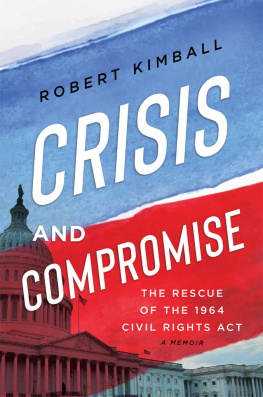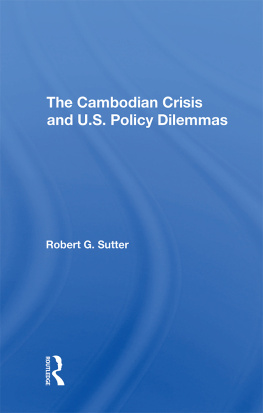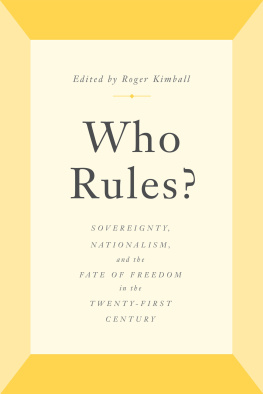Praise for Crisis and Compromise
With insightful analysis and crystalline reporting, Robert Kimball gives the lie to the notion that the Civil Rights Act was solely the result of White House management and Democratic energy. Republican leaders like Charlie Halleck and William McCulloch get their due, but so do countless lesser-known politicians and staff members who worked tirelessly to bring this landmark legislation to life.
Clay Risen, author of The Bill of the Century:The Epic Battle for the Civil Rights Act
Far more than a memoir, Robert Kimballs Crisis and Compromise traces in step-by-step detail the congressional maneuvers, backroom negotiations, betrayals, personalities, and emotions that gave birth to the 1964 Civil Rights Act. Told from the perspective of a young and eager congressional aid intimately involved in the process, Kimball refocuses the familiar narrative to highlight the seldom acknowledgedbut centralrole liberal and moderate Republicans played in passing the most important legislative act of the 20th century. Along with some surprising, revealing, and amusing stories about well-known participants in the process, Kimballs book is especially valuable at a time when bipartisanship appears to be a forgotten practice.
Arlene W. Saxonhouse, Caroline Robbins Professor of Political Science, Emerita University of Michigan
It seems unlikely that a story about the congressional journey of a bill would be a cliff-hanger, but Robert Kimballs memoir will keep you turning the pages even though you know the legislation will become law in the end. Not just any law, of course, but the Civil Rights Act of 1964. In this important, first-person chronicle about his experience working on the historic, bipartisan legislation as a staffer for Republicans in the House of Representatives, Kimball delivers a message that should be instructive to members of both parties in Congress today.
Joseph I. Lieberman, United States Senator from Connecticut (1989-1913)
Robert Kimballs memoir is a riveting revelation of the legislative maneuvering over the bill that would become the Civil Rights Act of 1964, the most important civil rights law in American history. As a recent Yale college graduate in the fall of 1963, Kimball played a key role behind the scenes in the deal-making that rescued a bill seemingly headed for defeat. Based on contemporaneous notes and files, this previously untold story is a significant contribution to the history of legislative and party politics in an era when, despite the noise of partisanship, compromise was possible.
Jethro K. Lieberman, author of The LitigiousSociety and other books on the American legal system
This stirring first person account of the negotiations to get the Civil Rights Act of 1964 through the U.S. House of Representatives sheds light on one of the most crucial moments in congressional history. Robert Kimball, as a Republican aide, participated in the action and now has recorded it. This book is a must read for students of the Civil Rights Act of 1964, congressional history, and leadership in action.
Robert D. Loevy, editor of The Civil Rights Act of 1964:The Passage of the Law That Ended Racial Segregation; Emeritus Professor of Political Science, Colorado College

This book is a memoir reflecting the authors present recollections of experiences over time. The words, except otherwise noted, and the story are the authors alone. Some details and characteristics may have changed, some events may have been compressed, and some dialogue may have been recreated.
Published by River Grove Books
Austin, TX
www.rivergrovebooks.com
Copyright 2021 Robert Kimball
All rights reserved.
Thank you for purchasing an authorized edition of this book and for complying with copyright law. No part of this book may be reproduced, stored in a retrieval system, or transmitted by any means, electronic, mechanical, photocopying, recording, or otherwise, without written permission from the copyright holder.
Distributed by River Grove Books
Design and composition by Greenleaf Book Group and Sheila Parr Cover design by Greenleaf Book Group and Sheila Parr
Grateful acknowledgment is made to the following sources for permission to reproduce copyrighted material.
From The Congress: Where Are We At Here? by Ronald Libonati from TIME magazine, November 1, 1963. Copyright 1963 TIME USA LLC. All rights reserved. Used under license.
http://content.time.com/time/subscriber/article/0,33009,875291,00.html
From Congress Faces Crucial Decision on Civil Rights by Anthony Lewis from the New York Times, October 28, 1963. Copyright 1963 The New York Times Company. All rights reserved. Used under license.
https://www.nytimes.com/1963/10/28/archives/congress-faces-crucial-decision-on-civil-rights-house-panel-acts.html
From Rights Bill Move Set For January by E.W. Kenworthy from The New York Times, December 6,1963. Copyright 1963 the New York Times Company. All rights reserved. Used under license. https://www.nytimes.com/1963/12/06/archives/rights-bill-move-set-for-january-smith-promises-action-by-house.html
Publishers Cataloging-in-Publication data is available.
Print ISBN: 978-1-63299-414-1
eBook ISBN: 978-1-63299-415-8
First Edition
To my wife, Abigail, for her incomparable patience, persistence, and perspicacity
I go for honorable compromise whenever it can be made. Life itself is but a compromise between life and death, the struggle continuing throughout our whole existence, until the great Destroyer finally triumphs. All legislation, all government, all society, is formed upon the principle of mutual concession, politeness, comity, courtesy; upon these, everything is based.
Henry Clay
During the debate in the United States
Senate on the Compromise of 1850
April 8, 1850
Early in life I had noticed that no event is ever correctly reported in a newspaper, but in Spain, for the first time, I saw newspaper reports which did not bear any relation to the facts, not even the relationship that is implied in an ordinary lie.... This kind of thing is frightening to me, because it often gives me the feeling that the very concept of objective truth is fading out of the world.... I am willing to believe that history is for the most part inaccurate and biased, but what is peculiar to our age is the abandonment of the idea that history could be truthfully written.
George Orwell
Looking Back on the Spanish Civil War (1943)
Few people will believe that the Republicans played such an important role in passing the civil rights bill. Someone needs to tell our story.
Representative Charles Halleck
(R-Indiana) to the author
Fall 1963
Contents
September 1962: Representative Thomas Curtis (R-Missouri) devises a strategy to help defeat the Industrial Security Bill, the first time the House Un-American Activities Committee is rebuffed in the United States House of Representatives.
Fall 1962: Republicans on the House of Representatives Judiciary Committee start drafting a comprehensive civil rights bill.
January 14, 1963: In his State of the Union address, President John Kennedy says the right to vote should not be denied to any citizen based on race or color.
January 31: Representative William McCulloch (R-Ohio), ranking Republican on the Judiciary Committee; Representative John Lindsay (R-New York); and other House Republicans introduce the first civil rights bill of the 88th Congress (196364).












